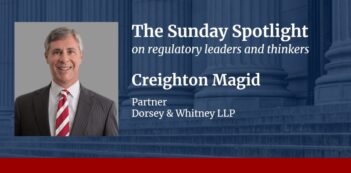
The next generation of compliance will be advanced by both public and private governance.
For all of my tenure as Assistant Attorney General, Environment and Natural Resources Division during the Obama Administration, Cynthia Giles was a friend, colleague, and often client in her role as the Assistant Administrator of the Office of Enforcement and Compliance Assurance at the U.S. Environmental Protection Agency (EPA).
As Giles had experience as an Assistant U.S. Attorney in Pennsylvania, she was knowledgeable about the bureaucracy of the U.S. Department of Justice and worked cooperatively with the Department during her tenure. Probably the two most celebrated cases during our time together were the litigation and settlement discussions that I led concerning the Deepwater Horizon Oil Spill, and then later the Clean Air Act civil and criminal enforcement action against Volkswagen for what is often called Dieselgate. Those two settlements were announced as the largest of their type in the Justice Department’s history, both exceeding over $20 billion in penalties and restoration requirements.
Giles’s important book on Next Generation Compliance is an encyclopedia of environmental actions, their history, and a roadmap for the future. One chapter, in particular, focuses on what she calls “Environmental Enforcement in the Next Gen Era.” She properly recognizes that enforcement “isn’t less necessary with Next Gen rules,” and that “Next Gen can assist but never replace” federal-level enforcement. She then turns to her view of revitalized enforcement in the New Gen era, including having enforcement push creative solutions and promote innovation. Finally, she concludes with what enforcement can do now to improve protection “while Next Gen ramp up.” She highlights EPA’s strategic use of civil and criminal enforcement and an enhanced focus on innovation in the form of “advanced monitoring, data analytics, field experiments, and settlements.”
As you would imagine, having worked together so long, I am in major agreement with her overview of the problems that will always need enforcement and the importance of such enforcement in our world with continuing compliance concerns. My background includes being the Chief of Environmental Enforcement, the career Deputy Assistant Attorney General, and finally the Senate-confirmed Assistant Attorney General supervising, among other matters, environmental enforcement matters. That experience has led me to have a healthy respect for where enforcement fits in the gestalt of environmental concerns. One of my favorite quotations, widely attributed to Ron Brackin, is: “Laws without enforced consequences are merely suggestions.”
To Giles’s superb enforcement discussion, I have two additions: (1) an emphasis on the importance of enforcement to the economy, and (2) a whole new role for private actors in advancing the environment using tools already at their disposal.
First, the economy.
During my tenure at the Justice Department, we initiated a plan to bring all refineries into compliance with the law, consistent with EPA’s national Petroleum Refinery Initiative addressing air emissions from the nation’s petroleum refineries. That initiative resulted in 37 settlements with U.S. companies that refine over 95 percent of the nation’s petroleum refining capacity. The settlements covered 112 refineries in 32 states and territories and will result in annual emissions reductions of more than 95,000 tons of nitrogen oxides and more than 260,000 tons of sulfur dioxide. Settling companies agreed to invest more than $7 billion in control technologies and pay civil penalties of more than $116 million.
At one stage, while we were midway through the initiative, a group of the companies that had already settled by judicially approved consent decree met with us to talk about their views of the initiative. They did not criticize the initiative. In fact, some companies praised our flexibility with implementation problems—we amended some decrees to give companies more time to comply or to substitute other equipment that was found to be better. What the companies were really there to say, however, was “don’t stop.” That is, they told us stories about seeing their competitors gain a competitive advantage by not making the changes EPA required. We had a long discussion, but decided they were absolutely correct, and we re-invigorated the initiative to reach all of the refineries that had significant compliance problems. In short, we sought to bring our cases so that no company gained an advantage in the marketplace by not complying with the law. That is only one of many examples of the importance of a comprehensive enforcement strategy that takes into account the need for there to be a level playing field for all businesses.
Second, the new and enhanced role of private governance.
Alongside the public enforcement Giles describes is a new and burgeoning effort by private actors to achieve and promote environmental compliance, a process many now call “private governance.” Probably the leading scholar in the nation on this subject, Vanderbilt Law Professor Michael P. Vandenbergh, has stated the importance of private environmental governance and encouraged policymakers to seek it out as a source of new responses to environmental issues. The bipartisan think-tank, the Environmental Law Institute, describes private governance as corporations and non-governmental entities developing voluntary agreements and standards together to decrease environmental impact, including through collective standard-setting. Deborah P. Majoras, former president of Proctor & Gamble and former chair of the Federal Trade Commission, has said that, although private standards are valuable tools to address environmental problems, collaboration is the most effective way to create solutions to sustainability issues.
A significant amount of academic literature now describes the emergence and importance of private governance, not as a replacement of but as an adjunct to public enforcement measures, thereby using market forces, citizen involvement, high tech instruments, and the power of private contracts to add more power and more authority to environmental goals. For me, the actors are anyone in the private sector: citizen groups, corporations, associations, and others.
In summary, Cynthia Giles has made a great contribution to the field of environmental law by her new book. Her ideas are worthy of deep consideration, and her vision of the future is compelling. For environmental enforcement, I would add the power of economic forces and a new future that includes both public and private governance.
This essay is one of a six-part series on The Next Generation of Regulatory Compliance.




